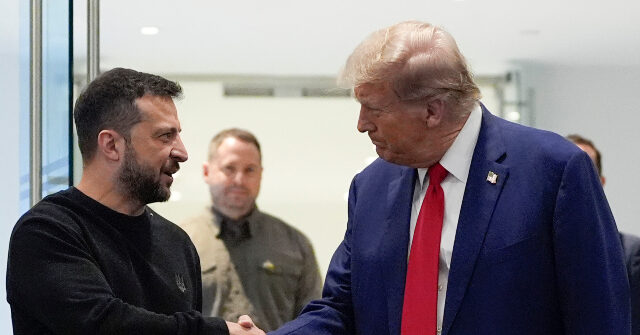The government of Ukraine confirmed on Monday that it is in the “final stages” of an agreement on selling rare earth minerals to America, a deal President Donald Trump floated as a way for America to get a return on its investment in supporting Kyiv against Russian invasion.
The announcement of the “final stages” of a deal, made by Minister of Justice Olha Stefanishyna, followed comments by President Volodymyr Zelensky in which he expressed hesitation about signing off significant rights to Ukraine’s plentiful rare earth minerals or in heavily indebting Ukrainians in the future. Zelensky’s remarks, after a turbulent week in which Trump disparaged Zelensky as a “dictator” and implied he should vacate the office, led many in international media to conclude that Ukraine would ultimately decline any such agreement with Washington.
Stefanishyna, however, insisted on Monday that the deal was not only still happening, but almost complete.
“Ukrainian and U.S. teams are in the final stages of negotiations regarding the minerals agreement,” she wrote in a statement on social media. “The negotiations have been very constructive, with nearly all key details finalized. We are committed to completing this swiftly to proceed with its signature.”
Ukraine is home to a bountiful supply of naturally occurring rare earth minerals and other minerals considered critical for modern industries. Among the most coveted are lithium, used to make batteries for mobile phones and laptops, and the critical nuclear energy product uranium. Ukraine is believed to be home to as much as five percent of the world’s known critical mineral reserves.
This wealth has made Ukraine an attractive target for China. The Ukrainian government, prior to Zelensky being elected president, became a member of China’s Belt and Road Initiative (BRI), a debt-trap scheme in which China offers poor countries predatory loans for alleged infrastructure projects. Zelensky has embraced the potential of Chinese investment in post-war Ukraine, inviting dictator Xi Jinping to talks and hoping “Chinese businesses” take an interest in reconstruction.
A major American presence in the Ukrainian mineral industry would likely have a deterrent effect on Chinese investment there, which often brings with it malign Chinese government influence and propagation of communist ideology.
President Trump had for many years enjoyed a positive relationship with Zelensky, particularly during his first term in office when the Ukrainian president steadfastly supported Trump against attempts by prominent Democrats to impeach him. Trump has been vocally critical of his predecessor Joe Biden’s Ukraine policy, however, condemning Biden’s decisions both to lift sanctions on Russia – which Zelensky loudly objected to and which immediately preceded the current invasion – and to funnel tens of billions of dollars into the war effort with no clear objective in sight.
In early February, Trump began floating the idea of signing an agreement with Kyiv for access to its mineral wealth.
“We’re telling Ukraine they have very valuable rare earths. We’re looking to do a deal with Ukraine, where they’re going to secure what we’re giving them with their rare earths and other things,” Trump told reporters. “We want a guarantee. We’re handing them money, hand over fist.”
“I want to have security of rare earths. We’re putting in hundreds of billions of dollars. They have great rare earths. And I want security of the rare earths, and they’re willing to do it,” he continued.
In remarks elsewhere, Trump suggested America should have access to “like $50 billion worth of rare earths” and claimed Kyiv had “essentially agreed to do that, so at least we don’t feel stupid.”
According to Trump’s White House estimates, America has invested about $300 billion in defending Ukraine from Russia’s invasion.
President Trump sent Treasury Secretary Scott Bessent on February 12 to discuss, among other issues, the rare-earth negotiations. Zelensky told Bessent that he wanted the agreement to include American security guarantees for Ukraine to prevent another future invasion.
“We value our partnership with the United States, are grateful for the support in defending our independence, and strive to expand our joint capabilities – especially in security,” Zelensky said during public remarks alongside Bessent. “Security matters. Moscow and its allies cannot be allowed to gain control over Ukraine, and that means we must work together – across the free world.”
By this weekend, however, Zelensky appeared to publicly hesitate, lamenting on Sunday that he would sign such an agreement if absolutely necessary but he feared greatly increasing Ukraine’s public debt.
“If this is necessary and we have no other choice, we must go for it. But my question is — when the US sells weapons to Israel, Qatar, and Saudi Arabia, they make 100% profit,” Zelensky was quoted as saying. “I want a dialogue with Trump. I want a dialogue. I am not signing something that ten generations of Ukrainians will have to repay.”
Zelensky nonetheless said that such talks were necessary “whether I like it or not because we need help.”
The Agence France-Presse (AFP) reported on Saturday that Zelensky was “not ready” to sign the current minerals deal and Zelensky himself claimed the $500 billion agreement was “no longer there,” indicating that a smaller agreement was in the works.
The American side appeared much more positive on the agreement, however, even before Stefanishyna confirmed progress in the negotiations on Monday. White House National Security Adviser Mike Waltz said during remarks at the Conservative Political Action Conference (CPAC) this weekend that a minerals agreement with Ukraine was due “in the very short term,” predicting, “Zelensky is going to sign that deal.”
Follow Frances Martel on Facebook and Twitter.
Read the full article here


